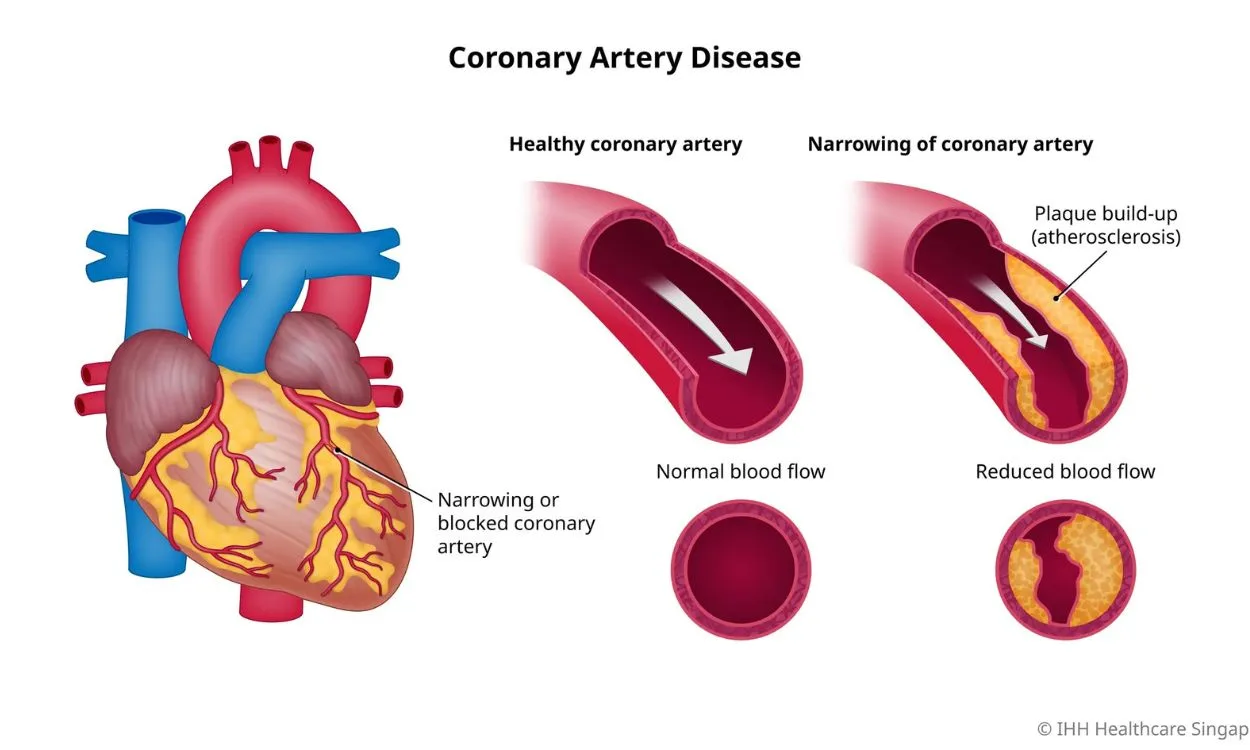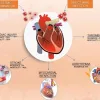What is Coronary Artery Disease?
Coronary artery disease (CAD), also known as ischemic heart disease, is a condition that affects the heart and its blood vessels. It occurs when there is a buildup of plaque in the arteries that supply blood to the heart muscle. This plaque is made up of cholesterol, fat, calcium, and other substances.
The plaque narrows the arteries and reduces blood flow to the heart, leading to a variety of symptoms and complications. If left untreated, CAD can result in heart attacks, heart failure, and even death.
Common Symptoms of Coronary Artery Disease
- Chest pain or discomfort, known as angina, which may feel like pressure, tightness, or squeezing in the chest.
- Shortness of breath, especially during physical activity or exertion.
- Fatigue or weakness.
- Rapid or irregular heartbeat (arrhythmia).
- Pain or discomfort in the arms, shoulders, jaw, neck, or back.
- Nausea, indigestion, or heartburn-like symptoms.
Risk Factors for Coronary Artery Disease
Several factors can increase the risk of developing coronary artery disease. These include:
- Age: The risk of CAD increases with age, particularly in men over the age of 45 and women over the age of 55.
- Smoking: Smoking damages blood vessels and increases the buildup of plaque.
- High Blood Pressure: Uncontrolled high blood pressure puts extra strain on the heart and increases the risk of CAD.
- High Cholesterol Levels: High levels of LDL cholesterol (bad cholesterol) and low levels of HDL cholesterol (good cholesterol) can contribute to plaque formation.
- Diabetes: Individuals with diabetes are at a higher risk of developing CAD due to the associated metabolic abnormalities.
- Obesity and Physical Inactivity: Being overweight or obese and leading a sedentary lifestyle increases the risk of CAD.
- Family History: Having a close relative with CAD increases the likelihood of developing the disease.
- Stress: Chronic stress can contribute to the development of CAD.
- Unhealthy Diet: Consuming a diet high in saturated and trans fats, cholesterol, and sodium increases the risk of CAD.
Prevention and Treatment of Coronary Artery Disease
Prevention and management of CAD involve lifestyle modifications and medical interventions. Here are some strategies:
Lifestyle Modifications:
- Adopting a heart-healthy diet rich in fruits, vegetables, whole grains, lean proteins, and healthy fats.
- Regular physical activity such as walking, jogging, swimming, or cycling.
- Quitting smoking and avoiding exposure to secondhand smoke.
- Maintaining a healthy weight and managing blood pressure, cholesterol levels, and diabetes.
- Managing stress through relaxation techniques, exercise, and social support.
Medical Interventions:
- Medications to manage risk factors such as high blood pressure, high cholesterol, and diabetes.
- Procedures like angioplasty or stenting to restore blood flow in the blocked arteries.
- Coronary artery bypass grafting (CABG) surgery to bypass obstructed coronary arteries.
Fitpaa’s Approach to Coronary Artery Disease Prevention and Management
Fitpaa recognizes the importance of preventing and managing coronary artery disease. Through its AI-driven technology and personalized approach, Fitpaa aims to support individuals in achieving their health and fitness goals. Here’s how Fitpaa can help:
- Metabolism Assessment: Fitpaa’s Metabolism Monitoring Technology assesses the individual’s current metabolism, identifying the root causes of their health condition, including CAD. This assessment helps create a personalized approach to managing the disease.
- Personalized Fitpaa Capsule: Fitpaa’s expert team of fitness coaches, nutritionists, and doctors develop a personalized Fitpaa Capsule based on the individual’s metabolism, health, fitness goals, lifestyle, and eating habits. The Fitpaa Capsule combines medical therapy, medical exercise therapy, medical nutrition therapy, and cognitive behavioral therapy to optimize metabolism and achieve health and fitness goals.
- Fitpaa Mobile App: Fitpaa’s mobile app provides a range of tools to support individuals in following their Fitpaa Capsule. The app includes a virtual workout trainer, diet tracker, performance tracking, progress tracking, and more. The Fitpaa Realtime Guidance technology incorporated in the app ensures timely nudging and habit-building to help individuals stay on track.
- Expert Guidance and Support: Fitpaa offers unlimited consultations, daily follow-up, and weekly reviews with a team of fitness planners, nutritionists, fitness trainers, and doctors. This guidance and support help individuals stay motivated, make necessary course corrections, and achieve their health and fitness goals.
Experience Fitpaa and Transform Your Life
Fitpaa is committed to helping individuals achieve their health and fitness goals, including preventing and managing coronary artery disease. With a personalized approach, expert guidance, and state-of-the-art technology, Fitpaa aims to transform lives and create a world where everyone can experience the joy of being fit and healthy.
To experience Fitpaa and access all the features and services mentioned above, download the Fitpaa app today. Start your journey towards a healthier and more fulfilling life, backed by guaranteed results. Your wellbeing is Fitpaa’s mission!









